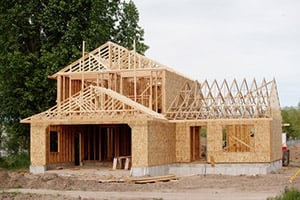 Is there a housing bubble? That's what investors are asking us today (Wednesday) after another drop in housing starts.
Is there a housing bubble? That's what investors are asking us today (Wednesday) after another drop in housing starts.
According to the Commerce Department, housing starts declined 9% in September. That was the second straight month of declines and has prompted fears of another U.S. housing bubble.
While an overall housing bubble is not an immediate concern right now, several housing markets have become overheated. In fact, we've found 10 housing markets that are approaching bubble territory.
Is There a Housing Bubble? Here's What the Numbers Say
Housing starts declined 9% in September to an annual rate of 1.047 million, thanks to a sharp drop in multifamily buildings. However, single-family starts rose 8.1% in September to 783,000.
While housing starts dropped, the number of building permits climbed.
The Commerce Department also reported building permits for private-owned housing units climbed 6.3% in September month over month. Single-family home permits, which account for roughly 60% of all permits, increased to a rate of 739,000 in September. That was a 0.4% increase from August.
Consensus estimates called for September permits to rise to a 1.17 million annual pace. Starts were expected to pick up to 1.18 million. Housing construction usually begins within two months of a permit being issued.
Through the first nine months of 2016, permits climbed 0.6% from 2015. Single-family permits were up 8.1% year to date through September.
With housing starts falling, investors keep asking us, "Is there a housing bubble?" Here's how our current data compares to the previous housing bubble and which housing markets are in the most trouble...
These Housing Markets Are Looking Most Dangerous
During the Great Recession of 2008, housing permits and starts fell precipitously. And both starts and permits remained at record-low levels for several years after the recession.
[mmpazkzone name="in-story" network="9794" site="307044" id="137008" type="4"]
While construction gauges have rebounded since 2011, the pace has slowed over the past year. So a housing crash is not an immediate threat like it was in 2008.
Prices for single-family homes are climbing, leading to more construction projects for these types of homes. However, construction of larger multifamily projects is decelerating.
Home buying has climbed this year thanks to wage gains, solid job growth, and low interest rates on mortgages. The interest rate on a 15-year mortgage loan is 2.71%, according to Bankrate. The rate on a 30-year is 3.47%.
But low inventory of new and existing homes is driving up prices. That means purchasing a home remains out of reach for many.
And while overall housing starts and permits are rising, they are nowhere near where they were a decade ago - right before the housing bubble that sparked the global financial crisis. Plus, lending requirements are stricter, and only the most qualified buyers are getting approved for loans.
Still, several U.S. housing markets are looking frothy...
After analyzing 50 major housing markets over the last 15 years, Realtor.com found the top 10 most overheated real estate markets. They are:
- San Jose, Calif.
- San Francisco, Calif.
- Austin, Texas
- Salt Lake City, Utah
- Dallas, Texas
- Los Angeles, Calif.
- Fresno, Calif.
- Buffalo, N.Y.
- Charleston, S.C.
- Portland, Ore.
The next look at the housing market will come Thursday when the Realtors Group releases data on existing homes sales for September. The Commerce Department's September report on new home sales will be released Oct. 26.
Trending Now: This penny stock could bring triple-digit gains - and save a dying industry at the same time. Click here to learn more...
Follow us on Twitter @moneymorning and like us on Facebook.
Related Articles:
- CNBC: U.S. Housing Starts Total 1.05M in Sept. vs 1.18 Million Starts Expected
- The Wall Street Journal: U.S. Housing Starts Fell 9% in September
- MarketWatch: Housing Starts Tumble 9% as Sturdy Recovery Remains Elusive


